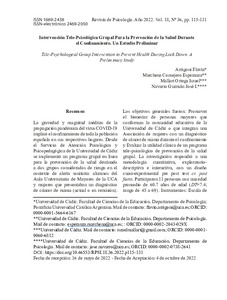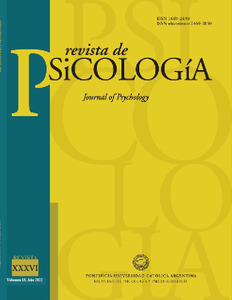Por favor, use este identificador para citar o enlazar este ítem:
https://repositorio.uca.edu.ar/handle/123456789/15369| Título: | Intervención tele-psicológica grupal para la prevención de la salud durante el confinamiento : un estudio preliminar Tele-psychological group intervention to prevent health during lock down : a preliminary study |
Autor: | Arrigoni, Flavia Susana Marchena Consejero, Esperanza Mallart Ortega, Israel Navarro Guzmán, José I. |
Palabras clave: | PREVENCION; TELEPSICOLOGIA; CONFINAMIENTO; COVID-19 | Fecha de publicación: | 2022 | Editorial: | Pontificia Universidad Católica Argentina. Facultad de Psicología y Psicopedagogía | Cita: | Intervención tele-psicológica grupal para la prevención de la salud durante el confinamiento : un estudio preliminar [en línea]. Revista de Piscología. 2022,18 (36). doi: 10.46553/RPSI.18.36.2022.p115-131 Disponible en: https://repositorio.uca.edu.ar/handle/123456789/15369 | Resumen: | Resumen: La gravedad y magnitud inéditas de la propagación pandémica del virus COVID-19 implicó el confinamiento de toda la población española en sus respectivos hogares. Desde el Servicio de Atención Psicológica y Psicopedagógica de la Universidad de Cádiz se implementó un programa grupal en línea para la prevención de la salud destinado a dos grupos considerados de riesgo en el contexto de alerta sanitaria: alumnos del Aula Universitaria de Mayores de la UCA y mujeres que presentaban un diagnóstico de cáncer de mama (actual o en remisión). Los objetivos generales fueron: Promover el bienestar de personas mayores que conforman la comunidad educativa de la Universidad de Cádiz o que integran una Asociación de mujeres con un diagnóstico de cáncer de mama durante el confinamiento y Evaluar la utilidad clínica de un programa tele-psicológico de prevención de la salud grupal. La investigación respondió a una metodología cuantitativa, exploratorio-descriptiva e interactiva, con un diseño cuasi-experimental pre post test ex post facto. Participaron 11 personas con una edad promedio de 60.7 años de edad (DT=7.4; rango de 45 a 69). Instrumentos: Escala de Emociones Positivas, Cuestionario de Salud
General (GHQ-12), Índice de Felicidad de
Pemberton y una ficha sociodemográfica
ad hoc. Tras la intervención se apreciaron
cambios estadísticamente significativos en
todas las variables en estudio: emociones
positivas (Z=-1.962; p< 0.05), malestar
psicológico (Z=-2.180; p < 0.007), bienestar
psicológico (Z=-2.030; p<0.02) e índice de
felicidad subjetivo (Z = -2.846; p < 0.04). Los
hallazgos permiten concluir que participar
en el programa resultó de utilidad clínica
y ayudó a proteger a los participantes del
impacto nocivo asociado al confinamiento
vivido durante los meses de abril a mayo del
año 2020 en España. Abstract: The unprecedented severity and magnitude of the pandemic spread of the COVID-19 virus meant that the entire Spanish population was locked down in their respective homes. From the Psychological and Psychopedagogical Care Service of the University of Cadiz, tele-psychology group program for health prevention was implemented for two groups considered at risk in the context of pandemic: students of the Elderly Classroom of the UCA and women who presented a diagnosis of breast cancer (current or in remission). The general objectives of the program were: To promote the well-being of elderly people who belong to the community of the University of Cadiz and of members of an association of women with a breast cancer diagnosis during lockdown and to evaluate the clinical utility of a tele-psychology group health prevention program. The research responded to a quantitative, exploratorydescriptive and interactive methodology, with a quasi-experimental design pre posttest ex post facto. Eleven people with an average age of 60.7 years participated (DT=7.4; range of 45 to 69). The instruments used were the Positive Emotions Scale, the General Health Questionnaire (GHQ-12), the Pemberton Happiness Index and an ad hoc sociodemographic data sheet. After the intervention, statistically significant changes were observed in all the variables studied: positive emotions (Z =-1.962; p< 0.05), psychological discomfort (Z=-2.180; p < 0.007), psychological well-being (Z=- 2.030; p<0.02) and subjective happiness (Z = -2.846; p < 0.04). The findings allow us to conclude that participating in the program was of clinical utility and helped to protect the participants from the harmful impact associated with the lockdown during the months of April to May of the year 2020 in Spain. |
Cobertura Espacial: | España | Cobertura Temporal: | SIGLO XXI | URI: | https://repositorio.uca.edu.ar/handle/123456789/15369 | ISSN: | 2469-2050 (online) 1669-2438 (impreso) |
Disciplina: | PSICOLOGIA | DOI: | 10.46553/RPSI.18.36.2022.p115-131 | Derechos: | Acceso abierto | Fuente: | Revista de Piscología. 2022,18 (36) |
| Aparece en las colecciones: | RdP - 2022 Vol. 18 nro. 36 |
Ficheros en este ítem:
| Fichero | Descripción | Tamaño | Formato | |
|---|---|---|---|---|
| intervención-tele-psicológica-grupal.pdf | 957,3 kB | Adobe PDF |  Visualizar/Abrir | |
| cover_issue_445_es_AR.png | 118,25 kB | image/png |  Visualizar/Abrir |
Visualizaciones de página(s)
42
comprobado en 27-abr-2024
Descarga(s)
71
comprobado en 27-abr-2024
Google ScholarTM
Ver en Google Scholar
Altmetric
Altmetric
Este ítem está sujeto a una Licencia Creative Commons

